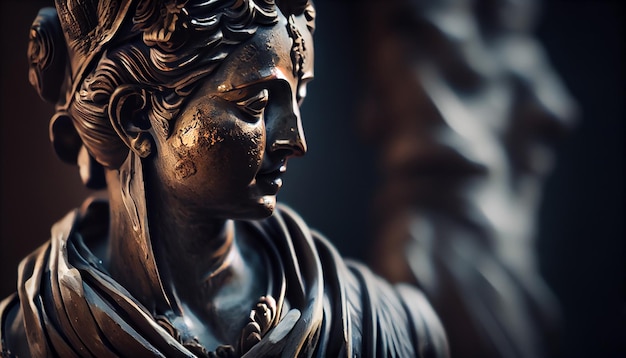Interesting Facts about Greek Gods

Greek gods were believed to reside on Mount Olympus.
Zeus, the king of the gods, was associated with thunder and lightning.
Poseidon, the god of the sea, was known for causing earthquakes and storms.
Aphrodite, the goddess of love and beauty, was said to have emerged from the sea.
Hermes, the messenger of the gods, had the ability to move swiftly between worlds.
Artemis, the goddess of the hunt, was often depicted carrying a bow and arrow.
Dionysus, the god of wine, was associated with celebration and ecstasy.
Athena, the goddess of wisdom, was born fully formed from Zeus’ head.
Apollo, the god of music and poetry, was also associated with healing and sun.
Hades, the god of the underworld, ruled over the realm of the dead.
Hephaestus, the god of fire and blacksmithing, was known for crafting powerful weapons.
Hera, the queen of the gods, was associated with marriage and childbirth.
Demeter, the goddess of agriculture, was responsible for the fertility of the earth.
Ares, the god of war, was feared and revered by warriors.
The Greek gods had human-like characteristics and often interacted with mortals.
They had the power to shape-shift and disguise themselves when interacting with humans.
The gods were believed to be immortal, but they could still experience pain and suffering.
The Greek gods were worshipped through elaborate rituals and festivals.
Interesting Facts about Greek Gods part 2
Many of the Greek gods had multiple romantic partners and children.
The gods often meddled in mortal affairs, influencing the outcome of wars and conflicts.
Greek mythology is full of stories of gods and goddesses falling in love with humans.
The gods had a complex family tree, with Zeus as the father of many other gods and demi-gods.
The Greek gods were not all-powerful; they had their own weaknesses and vulnerabilities.
Some gods were associated with specific symbolism, like Hermes with his winged sandals.
The Greek gods’ stories provided explanations for natural phenomena and human experiences.
Artemis’ sacred animal was the deer, and she was often depicted with a flock of loyal nymphs.
Hera was known for her jealousy and spitefulness, often punishing Zeus’ lovers and their children.
Zeus was revered as the ruler of the sky and the bringer of weather and rain.
Athena was the patron goddess of Athens, and a temple was dedicated to her on the Acropolis.
Greek gods were believed to have control over different aspects of life, such as love, war, and the arts.
The gods’ actions and decisions were often capricious and unpredictable.
The Greek gods were subject to emotions such as love, anger, and jealousy.
Dionysus was known for his wild and raucous celebrations, which often involved excessive drinking.
The gods could grant mortals favors or punishments, depending on their whims.
Greek gods were depicted in sculptures, paintings, and frescoes throughout ancient Greece.
Many of the myths involving the gods have been preserved in ancient Greek artwork and literature.
The gods’ personalities and stories continue to inspire modern literature and popular culture.
The Greek gods often served as moral lessons, teaching mortals about honor, bravery, and loyalty.
The gods were believed to intervene in battles, tipping the scales in favor of their chosen side.
The gods were also associated with specific cities and regions, offering their protection and favor.
Greek gods had human-like flaws and weaknesses, making their stories relatable to mortals.
Apollo had the ability to heal and bring diseases, which is why he was often prayed to for health.
The gods were believed to have created the world and all its creatures, including humans.
Many important decisions in ancient Greece, like going to war, were made after consulting the gods.
The stories of the Greek gods continue to capture the imagination and serve as a source of inspiration.